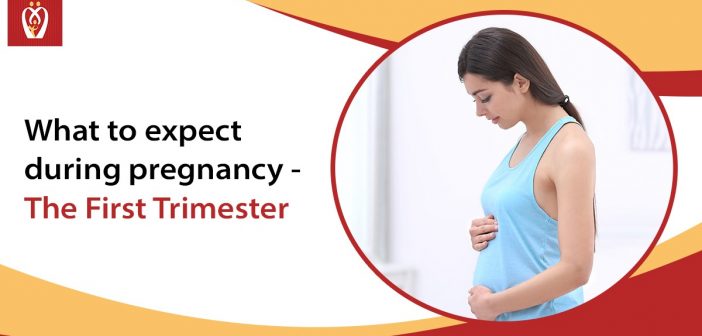What is the first trimester?
Pregnancy lasts approximately 40 weeks. There are three trimesters in pregnancy. The first trimester of a pregnancy is the period between conception and week 12 of the pregnancy.
During the first 12 weeks of pregnancy, a woman’s body goes through a lot of changes. What to eat, what prenatal tests to get, how much weight to gain, and how to ensure the health of the baby are some of the concerns that women have throughout pregnancy.
First trimester physical changes

Every woman’s pregnancy is unique. During the first trimester, some women are in perfect health, while others’ condition is a bit more tough. Here are some of the changes you might observe, what they signify, and which symptoms justify a visit to the doctor’s office.
Bleeding – During the first trimester of pregnancy, around a quarter of women have some light bleeding. Spotty bleeding is an indication that an embryo has successfully established itself in your uterus early on in pregnancy. The only exception to this is if you are experiencing severe bleeding, cramps or pain in your abdomen. A miscarriage or an ectopic pregnancy could cause these symptoms (a pregnancy in which the embryo implants outside of the uterus).
Breast discomfort – One of the first indicators of pregnancy during the first trimester is a sore breast. Breastfeeding-related symptoms might be caused by hormonal fluctuations. As you progress through the first three months of pregnancy, your breasts are likely to hurt. Wearing a support bra and going up a bra size (or more) can help you feel more at ease.
Constipation – Progesterone, a hormone produced by the uterus during pregnancy, reduces the rate at which food moves through the digestive tract. This is compounded by the increased iron you’re taking in from your prenatal vitamin, which can lead to bloating throughout your pregnancy. Maintain a healthy digestive system by consuming more fibre and drinking more water. Physical activity can also be helpful.
During pregnancy, moderate laxatives and stool softeners are okay to use if your constipation is really hurting you.
Discharge – Early in your pregnancy, you’re likely to notice a milky white discharge known as leukorrhea. There are several different types of pantyliners out there that can be used, but don’t put your vagina at risk by using a tampon. You should call the doctor if the discharge smells awful, it’s green or yellow, or there is a lot of clear discharge.
Fatigue – Your body is putting forth a lot of effort to keep up with the demands of a growing baby. That means you’ll become fatigued a lot more quickly than you normally would. Allow yourself to nap or rest when you feel the need during the course of the day. Check to see if you’re receiving adequate iron. There is a risk of developing anaemia as a result of a lack of sleep.
Food preferences and aversions – Pregnancy can alter your tastes. Pregnant women are more likely to experience food cravings. As long as you stick to a diet of mostly healthful, low-calorie meals, it’s fine to indulge in occasional cravings. A hunger for non-foods like clay, dirt, and laundry starch is an exception to this rule. Report this type of craving to your doctor as soon as possible.
Purging copiously – Despite the fact that your baby is still quite small, your uterus continues to expand during the first trimester, which is increasing the pressure on your bladder. As a result, you may find yourself constantly needing to use the restroom. Do not stop drinking water because your body needs it, but do reduce your caffeine intake, especially at night, as it stimulates your bladder. Do what you can to respond to the call of nature as quickly as possible. Don’t hold back.
Heartburn – Progesterone production increases throughout pregnancy. You can relax your lower esophageal muscle, the tube that links your mouth to your stomach. Normally, these muscles are responsible for keeping food and acids from rising to the top of your digestive tract. Acid reflux, also known as heartburn, can occur if the sphincter muscles relax.
First trimester: What happens to the foetus?
On the first day of your pregnancy, you’ll also begin your final menstrual cycle. Fertilization occurs when a sperm and an egg join 10 to 14 days after discharge of the egg. Rapid growth occurs in the first trimester of pregnancy. Fetal organs, a brain and spinal cord are being formed during this time. During the first trimester, the baby’s heart begins to beat.
First, arms and legs grow in the first few weeks, and then fingers and toes appear towards the end of eight weeks.
The care of the foetus during pregnancy
All of your health care providers will treat you, educate you, and reassure you throughout the course of your pregnancy, regardless of whether you choose a family physician, obstetrician or a midwife.
When you arrive for your first appointment, the doctor will check your overall health, look for any potential dangers, and determine your baby’s gestational age. Your doctor will inquire about your medical history in great detail. Be truthful with yourself. A private appointment is an option if you don’t want to disclose your medical history with your partner. Expect to learn about chromosomal abnormality screening in the first trimester as well.
The first 32 weeks of pregnancy will likely necessitate check ups every four weeks. However, your health and medical history may necessitate more or fewer visits. Pregnancy, labour, and life with a newborn are common topics of conversation during these visits. Remember that no inquiry is trivial or insignificant, and the answers can assist you and your baby.
Nurturey’s PinkBook helps you in managing your pregnancy and child health. If you are looking for a pregnancy book online, then this is your go-to.







